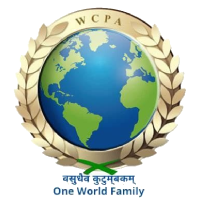WLA 28. World Bench On Juvenile Cases.
Summary of an Act:World Bench for Juvenile Cases
Short title: World Juvenile Court
Article 1. Establishes a World Bench for Juvenile Cases (Juvenile Court) as a permanent institution with the power to exercise jurisdiction over persons for most serious crimes of world concern. Complements national juvenile criminal jurisdictions. Supplements other benches of the World Court System. Governs jurisdiction and functioning of Juvenile Court. Lists purposes of the Juvenile Bench.
Article 2Designates first Seat of the Juvenile Bench to be in or near Lucknow, Uttar Pradesh, INDIA. Directs provisional world government to establish another Seat of Juvenile Bench in or near Kinshasa, Congo, as soon as feasible. Juvenile Bench may sit elsewhere, upon decision of Juvenile Bench.
Article 3.Legal status and Powers of the Juvenile Bench Assigns Juvenile Bench global legal personality. Assigns Juvenile Bench legal capacity for exercise of Juvenile Bench functions and fulfilment of Juvenile Bench purposes. Permits Court to exercise functions and powers anywhere on Earth.
Part 2. Jurisdiction, Admissibility and Applicable Law
Article 4. Crimes within the Jurisdiction of the Court
Limits jurisdiction of the Juvenile Court to cases involving juveniles:
- Cases that address serious crimes of concern to world community, in which defendant is juvenile, or was juvenile at time of commission of alleged crime. Assigns Court jurisdiction with respect to following crimes:
- Crime of genocide
- Crimes against humanity
- War crimes
- Crime of aggression
- Environmental crimes
- World federal corruption
- Interference in world government
- Determines jurisdiction.
Article 5Recognizes Elements of Crimes in effect for Juvenile Bench. Declares crimes described in World Legislative Act 19 for a Criminal Code Penalty Classification (Penal code) as also crimes for juveniles. Declares adult penal code sentencing parameters not in effect for children. Directs the World Judicial Commission to draft provisions for a juvenile penal code. Directs Provisional World Parliament to nominate Juvenile Advisory Committee, composed of juvenile members, to give recommendations to World Judicial Commission.
Article 6. Jurisdiction ratione temporisDeclares jurisdiction only with respect to crimes committed after entry into force of respective world statutes. Declares entry into force upon adoption by Provisional World Parliament.
Article 7 Describes Preconditions and exercise of jurisdiction
Article 8 Establishes office of Juvenile Case Prosecutor Prosecutor within the Office of World Attorneys General.
Article 9Declares Admissibility same as for respective adult benches, whether case is civil or criminal.
Article 10.Declares Challenges same as for adult cases. WLA 20, Article 19 WBCC)
Article 11Declares Ne bis in idem same as for adult cases (Same as WLA 20, Article 20 WBCC)
Article 12Declares Applicable Law same as for adult cases, except age is determining factor.
Part 3. General Principles of Juvenile Law
Article 13 Declares Nullem crimen sine lege also applicable for Juvenile Bench.
Article 14.Declares Nulla poena sine lege also applicable for Juvenile Bench.
Article 15Declares non-retroactivity ratione personae also applicable for Juvenile Bench. (Same as WLA 20, Article 24 WBCC)
Article 16Limits jurisdiction of Juvenile Bench to cases where juvenile has reached at least the age of 14 at the time alleged crime is committed. Permits prosecution of adult by Juvenile Bench, if accused adult was juvenile at time of alleged crime.
Article 17 Declares Mental element same as for adult cases. (Same as WLA20, Article 30 WBCC)
Article 18. Grounds for excluding criminal responsibility (Same as WLA 31, Article 30 WBCC), except that in cases where commission of crime takes place before defendant's 14th birthday, in which case, criminal responsibility is excluded. Juvenile Bench may determine conditions for treatment or care of juveniles for whom age excludes criminal responsibility. However, Juvenile Court must not subject underage juveniles to trial, nor juveniles or adults who were underage at time of commission of crime.
Article 19 Declares Mistake of fact or mistake of law same as for adult cases.(Same as WLA 20, Article 32 WBCC)
Part 4. Composition and Administration of the CourtArticle 20. Defines Organs of the Court
Article 21. Defines Service of Judges
Article 22. Defines qualifications, nomination and election of judges
Article 23 Directs Presiding Council of World Judges to fill juvenile judicial vacancies giving preference to Judges with expertise in Juvenile Law or with significant juvenile case experience.
Article 24Defines Chambers (Same as WLA 20, Article 39, WBCC)
Article 25Declares Independence of Judges (Same as WLA 20, Article 40., WBCC)
Article 26. Defines regulations for excusing and disqualification of judges (Same as WLA 20, Article 41, WBCC)
Article 27Defines Office of the Prosecutor (Same as WLA 20, Article 42, WBCC)
Article 28Defines Registry (Same as WLA 20, Article 43 WBCC)
Article 29 Defines Staff (Same as WLA 20, Article 44 WBCC)
Article 30Defines Solemn undertaking (Same as WLA 20, Article 45 WBCC)
Article 31Defines removal from office (Same as WLA 20, Article 46 WBCC)
Article 32. Sets disciplinary measures(Same as WLA 20, Article 47, WBCC)
Article 33 Declares Privileges and Immunities (Same as WLA 20, Article 48, WBCC)
Article 34. Defines salaries, allowances and expenses (Same as WLA 20, Article 49, WBCC) Salaries, allowances and expenses of Juvenile Court are same as for other benches of World Court System.
Article 35Declares official and working languages (Same as WLA 20, Article 50, WBCC)
Article 36.Defines Rules of Procedure and Evidence same as WLA 20, Article 51, WBCC, except that Juvenile Court shall give due consideration to best interest of child under all circumstances. Juvenile Court must provide arrangements for regular attendance of immediate family members of defendant, or of defendant's customary custodian, unless Court, under advice of competent authorities, determines that family members presence would be detrimental to well being of juvenile defendant. In case of working parents whose employers do not wish parent to attend, Court may decide, if necessary, to subpoena parents. Juvenile Court may order employer to allow leave for parents, if that is in best interest of defendant.. However, Juvenile Court must pay employer costs if employer is ordered to allow parental leave. Court may pay costs for parents or closest significant others to attend. If juvenile is found guilty, juvenile may be required to eventually pay restitution for costs incurred.
Juvenile Court must additionally pay close attention to the defendant's state of mind during trial. If juvenile requires rest, Court must recess for rest.
Juvenile Court must allow adequate time during course of day for defendant to receive adequate educational services. Direct instructional time may be up to four hours per day, four days per week. The Juvenile Court must provide qualified educational staff for defendant. Teacher student ratio in Juvenile Court system learning room is no more than six students per teacher. This Act recommends stronger teacher student ratio, such as two students per teacher, or four students per teacher. As feasible and appropriate for teaching in different subject areas, students may have multiple teachers in Juvenile Court System.
Article 37 Regulations of Court (Same as WLA 20, Article 52 WBCC), except that Juvenile Court may adopt additional regulations to adapt specifically to needs of juveniles.
Part 5. Investigation and ProsecutionArticle 38.Recommends procedure for Investigation and Prosecution to be based on the procedures defined for adult cases, but tempered for juvenile defendants. Encourages recommendations from the Judicial Commission for following matters:
Duties and powers of the Prosecutor
Rights of persons during an investigation
Role of Pre-Trial Chamber
Pre-Trial Chamber functions and powers
Issuance by the Pre-Trial Chamber of a warrant of arrest or a summons to appear
Arrest proceedings in the custodial state
Initial proceedings
Confirmation of charges before trial
Sanctions for misconduct before the Court.
Permits participation of juveniles in juvenile juries and Juvenile Court. Encourages juveniles to take active and orderly part in Juvenile Court process. However, prosecutor and presiding judges must meet qualifications as defined in Earth Constitution.
Part 7 SentencingDefines process for proposing applicable penalties, to be submitting to upcoming session of Provisional World Parliament.
Declares Non-Prejudice to national penalties and national laws, but only within limits of the Statute on the Rights of the Child.
Establishes Trust Fund for benefit of victims of crimes within jurisdiction of Juvenile Court, and of families of victims.
Permits Court to order money and other property collected through fines or forfeiture to be transferred, by order of Juvenile Court, to Trust Fund. Permits Assembly of States Parties to submit a proposal to the World Parliament for consideration.
Part 8. Provides for Appeal and Revision Part 9. Provides for International Cooperation and Judicial AssistancePart 10 Permits Judicial Commission to elaborate Enforcement procedures in conformance with the Statute on the Rights of the Child and other world law.
Part 11Permits Civil Cases involving juveniles to be handled by the Juvenile Bench: Cases of family custody cases of custodial dispute involving public agencies other civil cases involving juveniles
Part 12. FinancingRecognizes need to support families of juveniles and the need for juvenile residential facilities.
Part 13. Final clauses Permits format of Juvenile Code legislation to be presented in three forms, until second operational stage of world government begins, as defined in Earth Constitution:
- Legislative Summary
- Short form, with reference to World Legislative Act 20 (Criminal Court) in redundant articles and provisions
- Long form, including all redundant provisions from World Legislative Act 20 (Criminal Court)
Directs World Judicial Commission to examine and recommend improvements to Statute.
- Establishes Addendum with two lists and table of correlations of Criminal Bench to Juvenile Bench:
- Provisions of World Bench for Criminal Cases that are operative or substantially similar for Juvenile Court;
- Provisions of World Bench for Criminal Cases that are not operative, or that are substantially different for Juvenile Court:
- Table of corresponding differences between Criminal Court and Juvenile Court Statutes, by Article numbers or parts.
* * * * * * * * * *
The Statute for the World Juvenile Court was adopted by the eighth Session of the Provisional World Parliament convened in conformance with the constitution for the Federation of Earth in August 2004, at City Montessori School, Lucknow, Uttar Pradesh, India.
Attested: Eugenia Almand, Secretary
Provisional World Parliament

